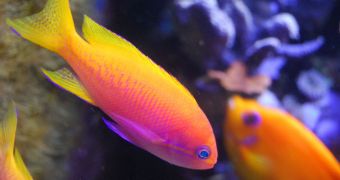All biology manuals in all countries around the world say that fish species developed gills in order to breathe. Teachers tell their students that the structures help facilitate the transfer of oxygen from the water into the marine creatures, thus basically allowing them to breathe under water. But, now, a new research seems to cast doubt on that. Scientists reveal that it is very likely the gills did not evolve specifically for the purpose of breathing, and that they most likely sustain this process as a secondary function, the BBC News reports.
It would now appear that the main role gills fulfill is that of cleansing the fish's bodies of dangerous chemicals. The conclusion was drawn based on a study of rainbow trout larvae. In experiments, researchers demonstrated that, as the larvae underwent their standard development processes, the ability to remove dangerous chemicals via the gills became obvious a long time before the creatures learned to use these structures for breathing, and exchanging oxygen and carbon dioxide with the water around them. The study was conducted by researchers at the University of British Columbia in Canada, led by expert and zoologist Clarice Fu.
In order to determine what types of chemicals the fish got rid of or accumulated through the gills, the UBC team measured the flow of ions such as sodium in and out of the animals. Ions are very tricky to keep in balance, and too many or too few of them in the bloodstream can cause severe side-effects in all living creatures. “In freshwater fish, like rainbow trout, they tend to lose ions from their blood to the water, because the ion concentration in blood is greater than that of freshwater,” Fu reveals. “When the gills are still immature, a significant portion of ion uptake occurs at the skin. As the fish get older and the gills mature, [this] can gradually shift to […] the gills,” she adds.
“We found that ion uptake shifted from the skin to the gills earlier than oxygen uptake. This led us to propose that the gills are needed for ion regulation earlier than they are needed for oxygen uptake,” the researcher continues. “Gills combine some of the functions of the lungs and kidneys in mammals, which leads to interesting interactions of function. The physical and chemical nature of the water can play an important role in their function. So how these all work together to get the various jobs done is very interesting and offers insight into how natural selection works,” University of San Diego Professor Rick Gonzalez says, adding that more investigation into this matter is necessary before a final conclusion can be drawn.

 14 DAY TRIAL //
14 DAY TRIAL //